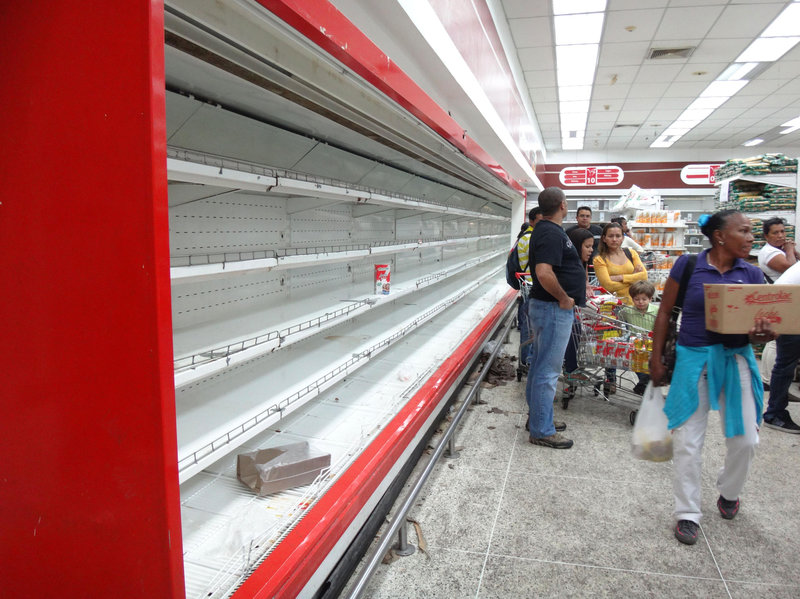Venezuela on track for the largest sovereign debt default in history
OPEC’s members, along with other major oil producers like Russia and the U.S., have all been feeling the pain of lower oil prices, but perhaps none more than Venezuela. The country relies on oil exports for “96 percent of its hard currency and 40-45 percent of the federal budget,” according to Paul Christopher, head global market strategist with Wells Fargo Investment Institute.
On January 15, Venezuelan President Nicolas Maduro declared an “economic emergency,” augmented by a political stalemate with the country’s congress, reports CNBC. The International Monetary Fund estimated Venezuela’s economy contracted by at least 7% in 2015 alone, and with inflation near triple-digits and crude unlikely to recover quickly, the country may soon be forced to default on its $185 billion in external debt.
If Venezuela defaults, it will be the largest default on sovereign debt in history, eclipsing Argentina’s 2001 default of more than $100 billion in obligations. Venezuela’s debt is not widely held by private institutions, but a default could have wider reaching implications in the region.
“Venezuela is in a death spiral,” said Steve Hanke, professor of applied economics at John Hopkins University and director of the Troubled Currencies Project. “Without a change of government or ideology,” both debt prices and Venezuela’s currency – the bolivar – “will continue to sink.”

Much of the country’s debt is denominated in its own currency, meaning that, in theory, the government can print whatever it needs to pay those obligations, even if it leaves the currency essentially worthless. Its debt held in other currencies could complicate a default, however.
Hanke said it might be possible to spark an eventual economic revival by liberalizing the market, but most observers say it is unlikely given Maduro’s ideological bent. It may also be possible to renegotiate of a loan with China to give Venezuela some breathing room, but chances still seem narrow given the price the country’s main commodity.
“The decline in oil prices is bringing Venezuela’s 2016 financing gap to levels that are difficult to fund,” Alejandro Arreaza, Latin America economist with Barclays investment bank, said in a recent note to clients. “Absent a fast recovery in oil prices in the next few months, a further contraction of imports or the use of available assets would be insufficient to avoid a default, in our view,” Arreaza said.
Both OPEC and non-OPEC members were in line with a deal to cut production
A campaign led by Venezuela to cut global oil production had gained momentum both within and outside OPEC, but Saudi Arabia appears unwilling to change its strategy of defending market share. That effectively killed Venezuela’s deal.
Algeria, Ecuador, Iran, Iraq, Nigeria, and Venezuela were ready to discuss production cuts with non-OPEC members Russia and Oman last week, reports Bloomberg, but the lack of cooperation from Saudi Arabia makes the gathering “pointless,” according to Commerzbank AG.
“The idea is to not just hold a meeting, but for all the countries to attend with the intention of reaching agreements,” said Venezuelan Oil Minister Eulogio Del Pino. “Current prices are below equilibrium, and that encourages the speculators and market instability.”
The Venezuelan oil minister was able to gain the support of several major producers last week. Russian Energy Minister Alexander Novak saying he would be willing to attend a meeting of OPEC and non-OPEC members if such a meeting were to occur, while Iran, which is preparing to add to the global glut to regain lost market share, said it was also willing to join the meeting.
Del Pino met with his Saudi counterpart Ali al-Naimi Sunday, but was not able to convince the Gulf producer to cut join the coalition in cutting production. Both Naimi and Del Pino reported that the meeting was productive, but neither said an agreement was reached to cut production, and an OPEC official from a Persian Gulf Arab country said “nothing really happened at the meeting,” reports The Wall Street Journal.
Oil futures took a hit following the news, falling as much as 4.3% after no concrete steps to cut production were announced in the meeting, reports Bloomberg. U.S. crude benchmark WTI and international benchmark Brent were both down more than 2% following the news at $30.12 and $33.12 per barrel, respectively.







